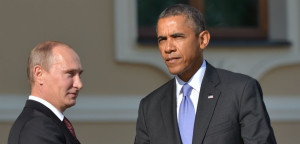Dual U.S.-Russian Citizen Admits to Spying on the United States for Moscow
Director of National Intelligence James Clapper has called Russia’s cyber-espionage capabilities the most sophisticated in the world. This week, U.S. officials showed that Russian President Vladimir Putin, a former KGB agent, still likes to engage in old-fashioned spying as well. But this time, his agent got caught.
Acting United States Attorney for the Eastern District of New York Kelly Currie and Assistant Attorney General for National Security John Carlin announced Wednesday that Alexander Fishenko, a dual citizen of the United States and Russia, pleaded guilty to illegally exporting controlled microelectronics to Russia. He also admitted to conspiring to launder money and obstruction of justice.
Fishenko, whom Carlin called “an agent of the Russian government,” was charged in October 2012, along with 10 other individuals and two corporations. Four of those arrested have already pleaded guilty, while the trial for three others is set to begin Sept. 21.
“Fishenko lined his pockets at the expense of our national security,” Currie said. “This prosecution highlights the importance of vigorously enforcing United States export control laws.”
Fishenko’s guilty plea could heighten espionage tensions between Russia and the United States. Putin took in NSA leaker Edward Snowden in 2013 after the American revealed the vast extent of American snooping around the world. Russian hackers also recently infiltrated State Department and White House computer systems.
According to federal prosecutors, between October 2008 and October 2012, Fishenko illegally shipped about $50 million worth of microelectronics and other technologies to Russia from the United States. This included equipment often used in military systems like detonation triggers, radar and surveillance systems, and missile guidance technology. Russia does not make this kind of technology domestically, prosecutors said.
Here’s how Fishenko’s scheme worked: In 1998, he founded Arc Electronics, Inc. in the United States, a company which claimed to be a traffic light manufacturer. He also served as an executive of Apex System, LLC, a procurement firm based in Moscow. Fishenko used his U.S.-based company to illegally ship technology to Apex, which then supplied the illicit goods to Russia’s military and intelligence services.
Prosecutors cited a letter from a lab linked to the FSB, Russia’s domestic intelligence agency. They said it proves Moscow’s spooks got their hands on the American technology: Namely, they complained that Fishenko’s equipment — routed through an affiliate of Apex — didn’t work properly.
Fishenko, 49, is possibly looking at a lengthy prison sentence. He faces up to 20 years in jail for each violation of the International Emergency Economic Powers Act and the Arms Export Control Act, as well as up to 20 years in prison for obstruction of justice and money laundering conspiracy. In addition, he could serve up to 10 years behind bars for acting as a Russian agent.
In June, the FBI arrested alleged Russian spy Evgeny Buryakov, who officials claim posed as a banker in the New York office of an unidentified Russian bank. He stands accused of working for Russia’s Foreign Intelligence Service to collect information on U.S. markets and financial institutions.
In: foreignpolicy

